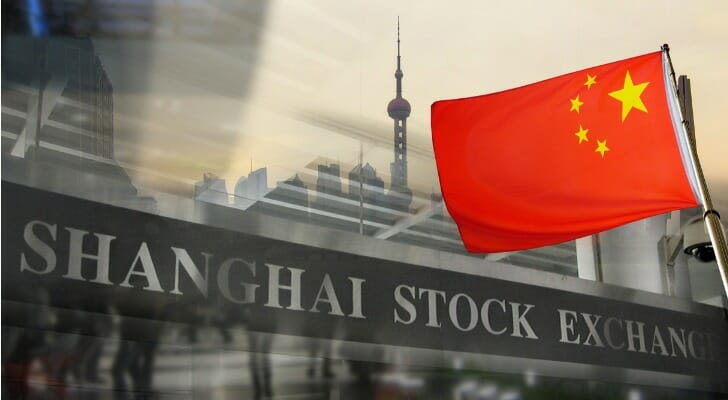The Shanghai Stock Exchange is the largest securities exchange in mainland China. It has a total market capitalization of approximately $7.26 trillion, making it the third-largest exchange in the world. Some of its listed companies are among the biggest in the world and it lists equities, bonds, indexes and derivatives. However, foreigners can only trade in Shanghai Stock Exchange securities with significant restrictions. Most foreign investors who want to participate in the Shanghai Stock Exchange do so by trading American Depositary Receipts and exchange-traded funds.
International holdings can add a valuable dimension to your portfolio, but investing in non-U.S. assets requires knowledge and you may benefit from working with a financial advisor.
What Is Listed on the Shanghai Stock Exchange?
The Shanghai Stock Exchange lists companies on two boards. The Main Board consists of large, well-established companies. The STAR Market is where shares of smaller companies are traded. Shares of stock traded on the Shanghai exchange can be either A shares or B shares. Prices for A shares are denominated in Chinese renminbi currency, abbreviated RMB. B share prices are stated in U.S. dollars.
Shanghai Listing Requirements
 The Shanghai Stock Exchange lists 1,490 companies, including some of the largest companies in the world. Many were formerly state-run enterprises that became partially or fully privatized after the Chinese government liberalized its policies toward capitalism beginning in the 1980s.
The Shanghai Stock Exchange lists 1,490 companies, including some of the largest companies in the world. Many were formerly state-run enterprises that became partially or fully privatized after the Chinese government liberalized its policies toward capitalism beginning in the 1980s.
The China Securities Regulatory Commission has to approve companies to be listed on the Shanghai exchange. Requirements for a Main Board listing include posting three consecutive years of profitability and, for the same period, the absence of any major adverse changes in its main business, directors and senior managers. In addition, companies must meet minimum standards for net assets, cash flow, revenue and net income.
The STAR Market listing requirements accommodate smaller and less well-established companies, with an added emphasis on innovation. In addition to meeting benchmarks for market value, net profit and cash flow, companies must invest a certain minimum share of revenue in research and development.
Shanghai Stock Exchange Largest Companies
The largest companies on the Shanghai exchange include a number of banks and insurance companies and some of the world’s biggest companies. Ranked by market capitalization, they are:
- Kweichow Moutai: the world’s largest beverage company, maker of China’s top liquor brand
- Bank of China: China’s most globalized bank.
- PetroChina: Oil and gas company.
- China Petroleum and Chemical: Oil and gas company
- Industrial Bank: Commercial bank
- CITIC Securities: Investment bank
- China Pacific Insurance: Provides integrated insurance services.
- China Citic Bank: An internationally oriented commercial bank.
- China State Construction Engineering: Largest construction company in the world.
- Qingdao Haier: A multinational home appliances and consumer electronics company.
Special Considerations for Investing

The Shanghai Stock Exchange first opened in 1866 and was closed in 1950 following the Communist revolution. It reopened in 1990. It is still not entirely open to foreign investors. For an institution to invest in the Shanghai exchange, it must apply for approval to the China Securities Regulatory Commission and the State Administration of Foreign Exchange.
Stock ownership among citizens of China is not as widespread as it is in other countries, and a large majority of the shares traded on the Shanghai exchange are held by a small number of wealthy people. This concentrated ownership can lead to significant volatility and wide swings in prices.
In addition to the exchange located in the coastal city of Shanghai, there are two other Chinese stock exchanges. The Hong Kong Stock Exchange is based in Hong Kong and the third, the Shenzhen Stock Exchange, is located in southern China, just north of Hong Kong.
How to Invest in the Shanghai Stock Exchange
Because of the restrictions on trading by foreign investors, most investors in the Shanghai Stock Exchange do so by buying and selling exchange-traded funds and American Depositary Receipts. The Shanghai Stock Exchange Composite Index is made up of all the stocks traded on the exchange and is often used an indicator of the Chinese market’s performance.
Many investment companies offer China funds that invest in stocks traded on the Shanghai Stock Exchange, among other Chinese exchanges, and sometimes the Hong Kong and Taiwan exchanges. This can be a more convenient way to invest in Chinese companies. Such China funds may focus on small-cap stocks, income-producing securities and other specialties.
The Bottom Line
The Shanghai Stock Exchange is one of the largest and oldest in the world, and the companies listed on it include some of the globe’s biggest enterprises as measured by market capitalization. However, the exchange was closed for decades and significant restrictions on trading by foreign investors remain. Also, many of the companies are still partly owned by the state, and the concentration of stock ownership in a few can produce wide swings in prices.
Tips for Investing
- As the world’s second-biggest economy, China represents an attractive opportunity for investors, but trading on the Shanghai Stock Exchange is different from the NYSE and NASDAQ. Before investing in this market, consider working with an experienced financial advisor. Finding a financial advisor doesn’t have to be hard. SmartAsset’s free tool matches you with up to three vetted financial advisors who serve your area, and you can interview your advisor matches at no cost to decide which one is right for you. If you’re ready to find an advisor who can help you achieve your financial goals, get started now.
- Since investing in non-U.S. securities is one of the riskier types of trading it’s important to keep close tabs on how much of your portfolio goes into such investments. A free, easy-to-use asset allocation calculator can be immensely helpful in keep your investments balanced.
Photo credit: ©iStock.com/TheaDesign, ©iStock.com/artisteer, ©iStock.com/zyxeos30
